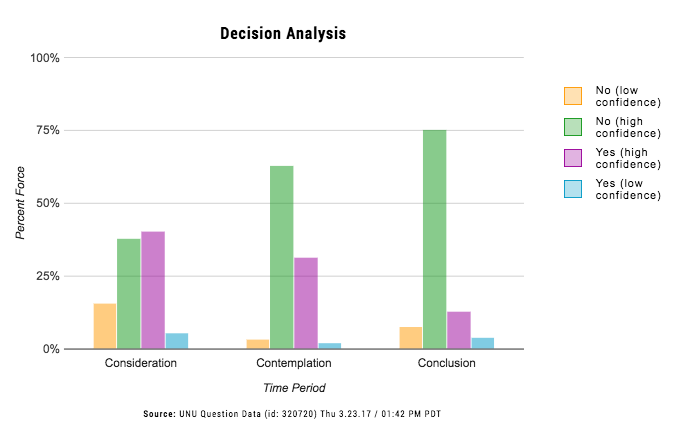The 2016 passing of Antonin Scalia left a controversial – but not unprecedented – vacancy, on the Supreme Court. While Republicans were reluctant to consider a new justice during an election year, the current vacancy would have to last until well into 2018 establish a new benchmark. To reach that level, President Trump’s nominee, Neil Gorsuch, would have to be rejected by the Senate, a move that would widely be considered Democratic payback for their Republican refusal to even hold hearings for Obama nominee Merrick Garland.
Given that so much of this process is centered on how Republicans and Democrats feel about nominees to the Supreme Court, predicting the sentiment of the Senate is an intriguing opportunity for researchers here at Unanimous A.I. to apply Swarm Insight. We used UNU, our Swarm A.I. platform, to challenge a group of American voters to amplify their intelligence and reveal how the Senate might approach the confirmation of Neil Gorsuch. These hearings can be highly partisan, and in fact, many of the Senate’s questions concerned whether or not Gorsuch would ever rule against Trump, so we asked the swarm if any Democrats would vote to confirm.

To his credit, Gorsuch dismissed the inquiry into his impartiality as a “softball” question, but the swarm was not convinced that Democrats would treat him with the same objectivity. As you can see in the replay above, the swarm of voters predicted that no Democrats would vote to confirm Gorsuch, and expressed “high confidence” in that outcome.
But, if you look more deeply in how our technology derived that insight, you’ll see that the swarm was nearly split 50/50 between YES and NO at the outset of the question. In fact, more people were pulling the puck towards YES initially, but over the course of the negotiation, the NOs slowly built momentum and eventually carried the day.

If the swarm was torn on the issue of Democratic unanimity, UNU revealed that it was much more confident that Democrats would, at least, use the filibuster to complicate Gorsuch’s confirmation – and perhaps all nominations to come. The filibuster is an agitative strategy that is, according to The Hill, both unlikely to block the confirmation completely and provoke a “nuclear” reaction from the GOP. Despite those insider concerns, the swarm is clear in its conviction.

What’s more, despite the expected Democratic attempts to block and delay his confirmation, our Swarm A.I. technology shows that voters ultimately expect that Gorsuch will be confirmed as the next justice of the United States Supreme Court. That suggests that the Hill’s concerns regarding the futility of the filibuster and the fallout in its wake are grounded in a reality. You can see links to all of the relevant replays by clicking on the chart below.
Ironically, Gorsuch’s confirmation hearing occurred at the same moment when the existing Supreme Court was unanimously voting to overturn one of his previous decisions. Gorsuch learned of the ruling during a short break in his grilling by the Senate, and the lesson should be clear – there are no easy decisions in cases like this, even when the judge in question was lauded by both sides of the aisle ( and approved unanimously ) a decade ago in his Senate Judiciary Committee confirmation.
Complicated, multi-variable decisions like this are exactly why Swarm Intelligence was developed in nature. At the moment, Unanimous AI is able to give unprecedented insight into how groups think using our Swarm A.I. technology. But, it’s not hard to imagine a future in which swarms are part of the government decision-making process itself.
Got a question for UNU, or just want to keep up to date with the Swarm’s insights? Drop us a line…


